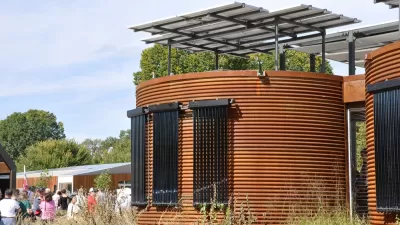As President Trump rolls back climate and energy regulations, many states are attempting to require utilities to get more power from renewable sources. Also, fewer states are attempting to reduce or eliminate renewable energy requirements.

"Today, 29 states require utilities to secure a certain percentage of their electricity from sources like wind and solar," reports Benjamin Storrow for E&E News. "In all, 10 states are considering an increase in renewable portfolio standards (RPS), according to the National Conference of State Legislatures (NCSL)," including:
- Massachusetts and California lawmakers are contemplating proposals to go 100 percent renewable (Climatewire, March 13).
- Legislators in Nevada and New Jersey have laid out plans to get 80 percent of their power from low-carbon sources.
- Efforts in Connecticut and Minnesota, where policymakers are debating boosting renewable energy mandates to 50 percent, are relatively modest by comparison.
Click on the map on the NCSL webpage to see the standards for states and U.S. territories.
However, the RPS, while effective at reducing greenhouse gas emissions, is not the best tool, according to Jay Apt, co-director of the Electricity Industry Center at Carnegie Mellon University. But from a political perspective, meaning one of most effective tools that stand a chance of being passed into law, they do well, he adds.
Many economists would prefer a carbon tax or cap-and-trade regimen to a mandate. A carbon price is more flexible and less costly, they reason. Instead of requiring power companies to adopt technologies like wind and solar, a cap or tax leaves it to the market to identify the least-costly compliance options.
No state has passed a carbon tax. Washington voters rejected a type of carbon tax last November. California is the only state to operate a cap-and-trade program, though it's future is questionable unless new legislation passes. Oregon is considering a program as well.
On the other side of the RPS debate, "[f]our states are considering bills to lower their current standards," writes Storrow. "Ohio and New Hampshire are considering full repeals. Concerns over costs are driving those debates."
In addition, "Americans for Prosperity, a conservative advocacy group funded by the Koch brothers, has been instrumental in many of the efforts to reduce or repeal state RPS mandates," adds Starrow. The group is also promoting a bill to repeal tax credits for electric vehicles in Colorado, reports Hiroko Tabuchi, business reporter for The New York Times.
FULL STORY: More states consider boosting renewable fuel mandates

Planetizen Federal Action Tracker
A weekly monitor of how Trump’s orders and actions are impacting planners and planning in America.

Chicago’s Ghost Rails
Just beneath the surface of the modern city lie the remnants of its expansive early 20th-century streetcar system.

San Antonio and Austin are Fusing Into one Massive Megaregion
The region spanning the two central Texas cities is growing fast, posing challenges for local infrastructure and water supplies.

Since Zion's Shuttles Went Electric “The Smog is Gone”
Visitors to Zion National Park can enjoy the canyon via the nation’s first fully electric park shuttle system.

Trump Distributing DOT Safety Funds at 1/10 Rate of Biden
Funds for Safe Streets and other transportation safety and equity programs are being held up by administrative reviews and conflicts with the Trump administration’s priorities.

German Cities Subsidize Taxis for Women Amid Wave of Violence
Free or low-cost taxi rides can help women navigate cities more safely, but critics say the programs don't address the root causes of violence against women.
Urban Design for Planners 1: Software Tools
This six-course series explores essential urban design concepts using open source software and equips planners with the tools they need to participate fully in the urban design process.
Planning for Universal Design
Learn the tools for implementing Universal Design in planning regulations.
planning NEXT
Appalachian Highlands Housing Partners
Mpact (founded as Rail~Volution)
City of Camden Redevelopment Agency
City of Astoria
City of Portland
City of Laramie





























